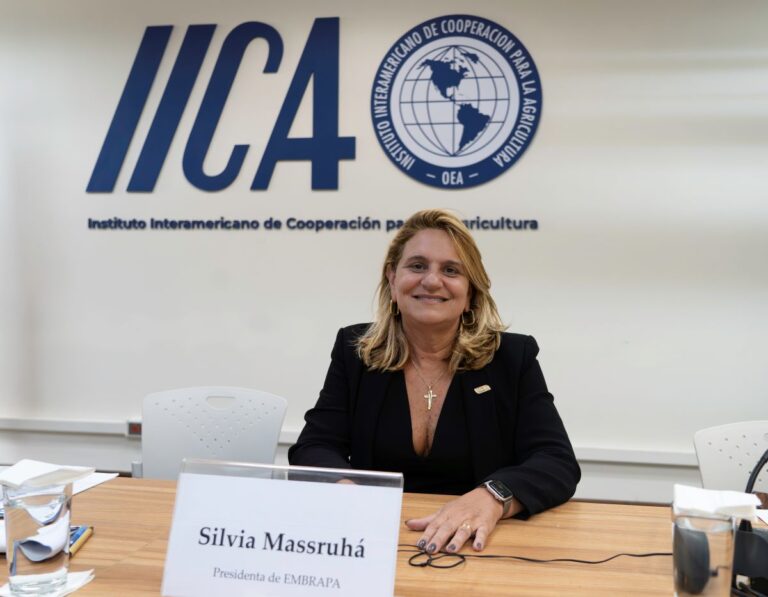The memorandum of understanding, which was signed in Buenos Aires by Alfredo Paseyro, Executive Director of ASA, and Manuel Otero, Director General of IICA, will generate technical cooperation actions aimed at preparing and implementing projects, conducting training sessions and exchanging information related to phytosanitary aspects, plant breeding and biotechnology, as well as seed treatment.

Buenos Aires, Argentina, 4 March 2019 (IICA). An agreement between the Argentine Seed Producers’ Association (ASA) and the Inter-American Institute for Cooperation on Agriculture (IICA) will allow for implementing joint work actions related to phytosanitary matters and seed treatment. This, in turn, will strengthen public-private collaboration to boost the competitiveness and sustainability of the agriculture sector as well as the preservation of the environment.
The agreement was signed in Buenos Aires by Alfredo Paseyro, Executive Director of ASA, and Manuel Otero, Director General of IICA, who highlighted the potential of the memorandum of understanding. The initial areas of cooperation described in the agreement are Phytosanitary Aspects, Plant Breeding and Biotechnology, as well as Seed Treatment.
The technical cooperation between ASA and IICA will include actions aimed at preparing and implementing projects, facilitating in-person and distance training opportunities, and exchanging information.
“The agreement with IICA is very important to us. We have established guidelines for areas we wish to work on, such as genetic improvement, seed treatment, phytosanitary issues of importance for seed movement, and regulatory frameworks in the field of biotechnology,” stated Paseyro, who signed the agreement with Otero at ASA headquarters.
“This agreement affords an opportunity to strengthen public-private relations; we are currently accomplishing this with INTA and may now do so at the regional level with IICA. As a result, we have a lot of expectations regarding the potential opportunities for Argentina,” he added.
On the other hand, Manuel Otero stated that “Argentina has one of the most successful agricultural models. Much of its success in this area is due to its technology and seeds; the country possesses solid institutions as well as modern regulatory frameworks that adapt to the evolution of countries.”
In this regard, he added, “Argentina plays an important role in guaranteeing global access to quality food. I am certain that additional agreements with other seed producers’ associations at the global level will follow. IICA is a knowledge platform that serves as a bridge between regions.”
Guillermo Bernaudo, Secretary of Agriculture, Livestock and Fisheries of Argentina, and Lázaro Sandoval, Agricultural Attaché for the United States in Argentina, Uruguay and Paraguay, witnessed the signing of the agreement.
“We believe that this type of public-private collaboration with an organization like IICA is important, given the Institute’s linkages with other countries in the Americas. Seeds account for a large part of agricultural development in the world; they encompass the use of rich, complex technologies that have an impact on productivity,” stated Bernaudo.
On the other hand, Sandoval noted, “on behalf of the U.S. Embassy and the U.S. Department of Agriculture, it is an honor to celebrate the signing of such an important agreement for the region. ASA and IICA are very important entities that are aligned with our food security goals. Both institutions understand the importance of disseminating knowledge and tools to assist producers in increasing their efficiency and taking advantage of the latest technology in order to achieve food security.”
About ASA
With over 70 years of experience, ASA is the oldest organization in Argentina’s seed production sector. Its partners include family, national and multinational seed companies and cooperatives involved in biotechnology, obtaining and creating new seed varieties, as well producing and distributing seeds.
Its objectives include advocating for the seed industry as well as fostering free trade and the commercial movement of seeds under equitable regulations that protect the interests of seed producers, farmers and consumers alike.
The association also works to guarantee intellectual property rights for phytogenetic creations and to foster the use of technology with the aim of improving the quality of plant propagation material.
More information:
Institutional Communication Division











